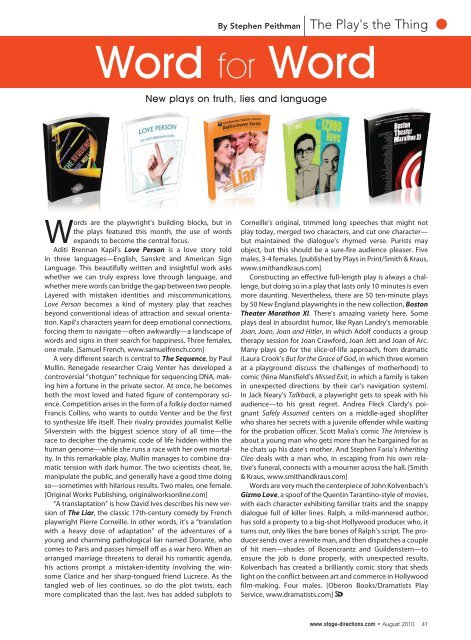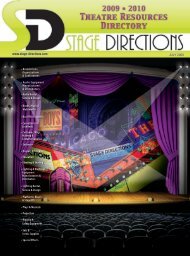Download a PDF - Stage Directions Magazine
Download a PDF - Stage Directions Magazine
Download a PDF - Stage Directions Magazine
Create successful ePaper yourself
Turn your PDF publications into a flip-book with our unique Google optimized e-Paper software.
The Play's the Thing<br />
By Stephen Peithman<br />
|<br />
Word for Word<br />
New plays on truth, lies and language<br />
Words are the playwright’s building blocks, but in<br />
the plays featured this month, the use of words<br />
expands to become the central focus.<br />
Aditi Brennan Kapil’s Love Person is a love story told<br />
in three languages—English, Sanskrit and American Sign<br />
Language. This beautifully written and insightful work asks<br />
whether we can truly express love through language, and<br />
whether mere words can bridge the gap between two people.<br />
Layered with mistaken identities and miscommunications,<br />
Love Person becomes a kind of mystery play that reaches<br />
beyond conventional ideas of attraction and sexual orientation.<br />
Kapil’s characters yearn for deep emotional connections,<br />
forcing them to navigate—often awkwardly—a landscape of<br />
words and signs in their search for happiness. Three females,<br />
one male. [Samuel French, www.samuelfrench.com]<br />
A very different search is central to The Sequence, by Paul<br />
Mullin. Renegade researcher Craig Venter has developed a<br />
controversial “shotgun” technique for sequencing DNA, making<br />
him a fortune in the private sector. At once, he becomes<br />
both the most loved and hated figure of contemporary science.<br />
Competition arises in the form of a folksy doctor named<br />
Francis Collins, who wants to outdo Venter and be the first<br />
to synthesize life itself. Their rivalry provides journalist Kellie<br />
Silverstein with the biggest science story of all time—the<br />
race to decipher the dynamic code of life hidden within the<br />
human genome—while she runs a race with her own mortality.<br />
In this remarkable play, Mullin manages to combine dramatic<br />
tension with dark humor. The two scientists cheat, lie,<br />
manipulate the public, and generally have a good time doing<br />
so—sometimes with hilarious results. Two males, one female.<br />
[Original Works Publishing, originalworksonline.com]<br />
“A translaptation” is how David Ives describes his new version<br />
of The Liar, the classic 17th-century comedy by French<br />
playwright Pierre Corneille. In other words, it’s a “translation<br />
with a heavy dose of adaptation” of the adventures of a<br />
young and charming pathological liar named Dorante, who<br />
comes to Paris and passes himself off as a war hero. When an<br />
arranged marriage threatens to derail his romantic agenda,<br />
his actions prompt a mistaken-identity involving the winsome<br />
Clarice and her sharp-tongued friend Lucrece. As the<br />
tangled web of lies continues, so do the plot twists, each<br />
more complicated than the last. Ives has added subplots to<br />
Corneille’s original, trimmed long speeches that might not<br />
play today, merged two characters, and cut one character—<br />
but maintained the dialogue’s rhymed verse. Purists may<br />
object, but this should be a sure-fire audience pleaser. Five<br />
males, 3-4 females. [published by Plays in Print/Smith & Kraus,<br />
www.smithandkraus.com]<br />
Constructing an effective full-length play is always a challenge,<br />
but doing so in a play that lasts only 10 minutes is even<br />
more daunting. Nevertheless, there are 50 ten-minute plays<br />
by 50 New England playwrights in the new collection, Boston<br />
Theater Marathon XI. There’s amazing variety here. Some<br />
plays deal in absurdist humor, like Ryan Landry’s memorable<br />
Joan, Joan, Joan and Hitler, in which Adolf conducts a group<br />
therapy session for Joan Crawford, Joan Jett and Joan of Arc.<br />
Many plays go for the slice-of-life approach, from dramatic<br />
(Laura Crook’s But for the Grace of God, in which three women<br />
at a playground discuss the challenges of motherhood) to<br />
comic (Nina Mansfield’s Missed Exit, in which a family is taken<br />
in unexpected directions by their car’s navigation system).<br />
In Jack Neary’s Talkback, a playwright gets to speak with his<br />
audience—to his great regret. Andrea Fleck Clardy’s poignant<br />
Safely Assumed centers on a middle-aged shoplifter<br />
who shares her secrets with a juvenile offender while waiting<br />
for the probation officer. Scott Malia’s comic The Interview is<br />
about a young man who gets more than he bargained for as<br />
he chats up his date’s mother. And Stephen Faria’s Inheriting<br />
Cleo deals with a man who, in escaping from his own relative’s<br />
funeral, connects with a mourner across the hall. [Smith<br />
& Kraus, www.smithandkraus.com]<br />
Words are very much the centerpiece of John Kolvenbach’s<br />
Gizmo Love, a spoof of the Quentin Tarantino-style of movies,<br />
with each character exhibiting familiar traits and the snappy<br />
dialogue full of killer lines. Ralph, a mild-mannered author,<br />
has sold a property to a big-shot Hollywood producer who, it<br />
turns out, only likes the bare bones of Ralph’s script. The producer<br />
sends over a rewrite man, and then dispatches a couple<br />
of hit men—shades of Rosencrantz and Guildenstern—to<br />
ensure the job is done properly, with unexpected results.<br />
Kolvenbach has created a brilliantly comic story that sheds<br />
light on the conflict between art and commerce in Hollywood<br />
film-making. Four males. [Oberon Books/Dramatists Play<br />
Service, www.dramatists.com]<br />
www.stage-directions.com • August 2010 41

















